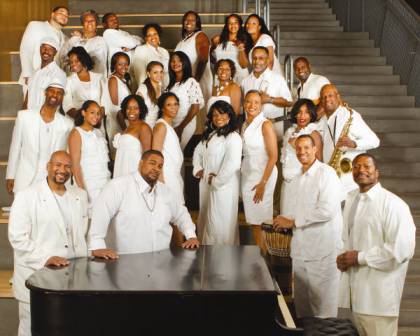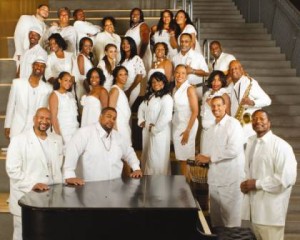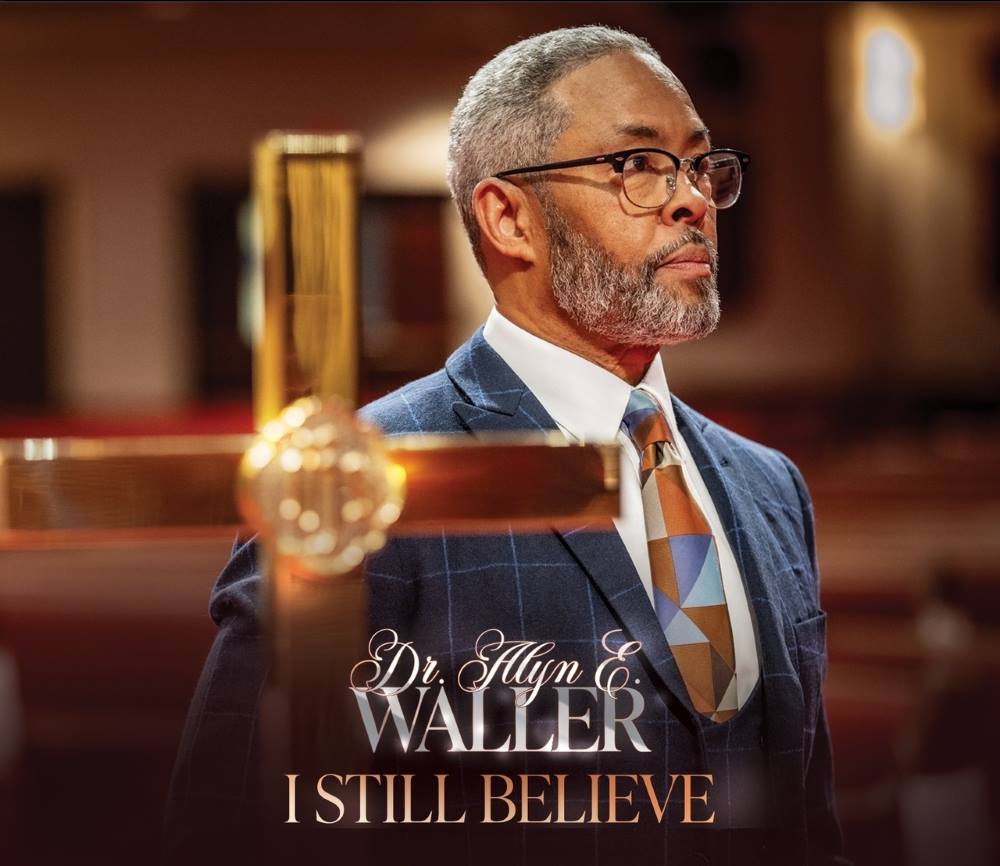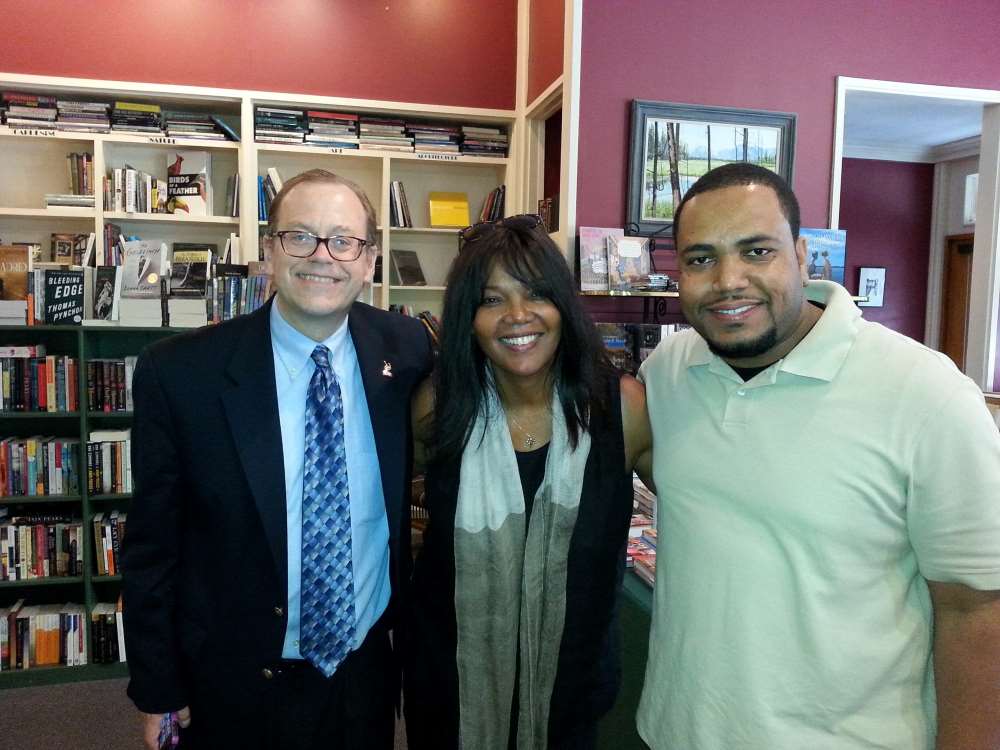This evening at 6:00 p.m., at the Mall of America’s Best Buy Rotunda in Bloomington, Minnesota, Malaco Music Group Recording Artists the Sounds of Blackness will be hosting a free 30 minute concert.
It is one of the activities surrounding the release of the group’s tenth CD, which hits stores today.
The Sounds of Blackness’s eclecticism and versatility over the past forty years have garnered three GRAMMY Awards and a host of other accolades.
TBGB spoke with the group’s founder, Gary Hines (G), and featured vocalist Jamecia Bennett (J) as they reflected on the group’s journey from Twin Cities college choir to international acclaim.
TBGB: What was the seed that brought Sounds of Blackness into being?
G: In the late sixties, my alma mater, Macalester College, embarked on an ambitious project called EEO – Expanded Educational Opportunities – to recruit students of color. EEO was successful, and among its offshoots were a number of student-created organizations. One was a fifty-voice choir called the Macalester College Black Voices. In 1971, I was blessed to have the group bring me on as director. We changed the name to Sounds of Blackness, because even then we wanted to do every style of African American music and needed a name to reflect that.
TBGB: What critical moment in history brought the group to everyone’s attention?
G: First and foremost, it happened by the grace of God, but the vehicle that took it to the next level were our friends, Jimmy Jam and Terry Lewis, who made us the first artists signed to their record label, Perspective Records, in 1990. What we were doing on a local, regional and sometimes on a national level became completely national and international through Perspective, A&M Records and Polygram Distribution.
TBGB: How did the gospel community embrace Sounds of Blackness?
G: We have always enjoyed support from the gospel community, and we have also experienced criticism from day one. We talk to different artists like Kirk Franklin and Mary Mary who have experienced the same thing, and to some degree still do, and I remind them, and myself, that Mahalia Jackson, the unquestioned Queen of Gospel, got grief when she started. People thought she had too much beat or she sounded too bluesy. I figure if the Queen of Gospel can catch heat, we can catch some too!
TBGB: Speaking of great singers, how did Ann Nesby get involved with Sounds of Blackness?
G: Ann joined us around 1989 and was a part of Sounds of Blackness productions, such as The Night Before Christmas, a Martin Luther King concert called Music for Martin, and Evolution of Gospel which, before it was a CD, was a stage production. But our families go back to the sixties. Ann’s mother and father are ministers from the Rockford (IL) and Joliet (IL) area. Ours were sister churches. Then leap ahead to the late eighties: [her sister] Marie is already a member, and Ann comes on and that’s how she started.
TBGB: Jamecia, tell us about your background.
J: I am the daughter of the former lead singer, Ann Nesby, and am also an actress, producer, and singer-songwriter. I started in the Sounds of Blackness when I was seventeen, so I’ve been in the group around twenty years.
TBGB: Had you always wanted to be a singer?
J: I don’t know if I always wanted to be a singer, but I was born into it. I started singing at church and directing the choir when I was four years old. My grandfather was a minister, my father was a minister, my uncles were ministers, so I was a PK [pastor’s kid]. I grew up in the church; it was just who I was. But at fourteen years old, if I had had the chance to not do [music] ever again, I probably would have said yes, because my friends were outside playing and I was at the piano learning harmony and learning how to play drums. Today, however, I totally appreciate it!
TBGB: Sounds of Blackness has traveled all over the world. Has there been a particularly memorable trip?
J: For me, it would be Japan. I didn’t get a chance to go on the Africa trip, but that trip seems to be the most memorable for the rest of the group.
G: There hasn’t been a place that we’ve gone that we haven’t loved, but Africa was special, especially after singing about it for so many years. We went there with Stevie Wonder to the Pan African Festival. When we got there, to have them tell us, “Welcome home,” it was just extra-special.
TBGB: Talk about the new CD.
G: We put the [self-titled] project together in about ten months. It energized the group to work on so many different styles of music. We always try to be versatile, but this is yet another level of that.
The zulu word ubuntu, or “humane-ness,” is one of the central concepts of the album, but the album is also about inspiration and healing. For example, Jamecia is the primary writer, featured vocalist and producer of the current single, “Fly Again.” It is an optimistic song in the midst of war, economic downturn, bankruptcy, layoffs, and unemployment. In the midst of this, people need something to inspire them. That’s the essence of what this record is all about: to inspire people.
TBGB: What do you want listeners to come away with when they hear the new album?
G: The best thing we can hear is for someone to say that our music helped save their life, or their friend’s life, or helped them when they were in an abusive relationship, or helped bring them closer to God. We treasure the awards, but ultimately, we want those kinds of things to happen.
TBGB: Have people come to sacred music through the Sounds of Blackness?
G: Absolutely. Let me tell you a story. We were in London about a year and a half ago. It was near the end of a concert and we were doing “Optimistic,” which is our standard. I could see a young woman in the midst of the crowd straining to get to the stage. I’ll never forget it. She handed me a handwritten note. I looked at it, even though we were still playing, because she had this look of urgency on her face. On the note she had written, “My mother died. ‘Optimistic’ saved my life.” I mean…what else can you say?
TBGB: Is there a style of music, or type of performing art, that the group hasn’t yet done but would like to do someday?
J: I think one of our songs should be in a completely different language, like Japanese. I think we should attempt something like that. It would be powerful.
G: I totally agree, Jamecia! We’ve been blessed to work in different musical genres. On the country side, we’ve worked with Vince Gill and Dolly Parton and Lyle Lovett. On the rock side, with Sting and John Mellencamp. On the classical side, with the Cleveland Philharmonic and the Minnesota Orchestra. We’ve done world beat. We haven’t done heavy metal [laughs], but I agree, a complete track in a foreign language would be awesome.
TBGB: Besides promoting the new album, what is next for Jamecia Bennett and Sounds of Blackness?
J: I recently produced six tracks for [BET Sunday Best winner] Le’Andria Johnson and just flew back from Texas where I produced her Christmas album, which will be out this Christmas. I’m also on stage right now, doing The Rocky Horror Show, while I’m still giving 100 percent to Sounds of Blackness.
G: We’re looking to do the Sounds of Blackness Christmas show and, if not this year, in 2012 we want the Christmas show to tour nationally. Also, our new label, Malaco, is excited about Jamecia, as they should be, and also about maybe doing a generational track or CD: starting with Jamecia’s grandmother, who we call lovingly “Sister Bennett” – she can still sing, trust me! And then Ann who is phenomenal, Jamecia, Paris Bennett [finalist on American Idol, Season 5] who is Jamecia’s daughter. Remember the song, “Little Egypt?” Well, there’s a little one called Egypt, and I wouldn’t be surprised if that talent doesn’t flow down to her as well!
For more information, go to http://www.malaco.com/and http://www.soundsofblackness.com/.
Watch the video for “Fly Again,” featuring Jamecia Bennett:
Written by : Bob Marovich
Bob Marovich is a gospel music historian, author, and radio host. Founder of Journal of Gospel Music blog (formally The Black Gospel Blog) and producer of the Gospel Memories Radio Show.











 Visit Today : 10
Visit Today : 10 This Month : 113
This Month : 113